Catch Me If You Can (2002)
Rated PG-13
(for some sexual content and brief language)
Released: December 25, 2002
Runtime: 141 minutes
Director: Steven Spielberg
Starring: Leonardo DiCaprio, Tom Hanks, Christopher Walken, Amy Adams, Martin Sheen, Nathalie Baye, James Brolin
Available to rent through Amazon Video.
Day 23 of “30 Days of Spielberg”
Watching Catch Me If You Can again, and appreciating just how different it is from anything that Spielberg had made before (or since), I began to realize the profound – maybe even unconscious – shift that must’ve happened after A.I.: Artificial Intelligence.
I’ll get to this movie in a bit, but first, indulge my armchair psychology. I think it goes a long way in constructing a paradigm of how to think about Spielberg’s entire post-Saving Private Ryan oeuvre. The conclusion Spielberg seems to come to about himself happens to be the very self-discovery that a father wants his son to embrace in Catch Me If You Can.
Prior to the 21st Century, Spielberg’s career was made of two broad sections: the first and biggest was his blockbuster era, from Jaws in 1975 to Jurassic Park in the summer of 1993. There were some intentional moves toward more serious work late in that period, but it wasn’t until 1993’s Schindler’s List that Spielberg dove full force into what would dominate his second, shorter phase: tackling the historical events that were at the soul of his race and religion (Judaism) and then those at the soul of his country and generation.
Then he made A.I. and everything changed.
I suspect, perhaps, that maybe the sudden death of his friend Stanley Kubrick (and what that icon left unfinished) made a sobering impact. After that film, even with the lackluster box office and polarized response it received (the kind of criticisms that, in the past, would’ve affected his future choices), Spielberg’s career has been defined by one guiding principle: from now on, he’s just going to make the films that he really wants to make, and how he really wants to make them.
He’s not going to be driven by box office calculation, nor the promise that a certain type of material may garner him more respect. He will continue trying (and wanting) to thrill and move audiences, and he’ll also try to say important things; but now, it seems, if a particular movie ends up only achieving those ends for himself and not the masses (or the Oscar voters), well, he’s just fine with that. Life’s just too damn short.
Catch Me If You Can is the culmination of that shift. It’s the kind movie Spielberg never would’ve made for the first twenty years of his career, even if he had the desire to. It didn’t fit any of the boxes he was trying to fill. But with A.I., he set aside those boxes once and for all. And if that means he ends up making another 1941, then fine. (It’s telling how Spielberg talks about that bomb with affection now.)
This new Spielberg may never give us another classic, but he’s already given us his share of those and then some. Now, Spielberg wants to try his hand at different things, or at doing the old things very differently (Exhibit A: Minority Report). Or in the case of Catch Me If You Can, inspired by the real-life exploits of Frank Abagnale Jr., it’s a fresh spin on an old thing that becomes an entirely new kind of thing for the Oscar-winning blockbuster legend.
Variations on Hitchcock, Ford, Hawks, Lean, and others marked Spielberg’s entire career. But with his 20th feature film, he finally got around to a 60s-era Billy Wilder comedy with flavors of Blake Edwards (one can easily imagine a young Redford or Beatty paired with Jack Lemmon in the two lead roles). Just as he’d done with other genre auteurs, Spielberg takes the light and breezy mid-century sophistication these two filmmakers mastered, infuses it with sentiment, and then grounds it all in family-related dysfunctions and nostalgia.
Before he was even 21, Frank Abagnale Jr. had successfully masqueraded as a doctor, lawyer, and airline pilot to such a degree that he fleeced various employers out of millions of dollars. Spielberg vicariously captures Frank’s outlandish lifestyle of women, travel, money and parties with the classy gloss of a dreamlike fantasy straight out of Madison Avenue. It’s a whirlwind that swept a then-unknown Amy Adams off her feet and into an attention-grabbing, career-making turn that had everyone asking, “Who is that?!”
Catch Me If You Can is a bubbly confection of champagne cinema, with a blithe elegance set right off the top by the best opening titles this side of Saul Bass and a John Williams score channeling Henry Mancini and Marvin Hamlisch.
But this is Spielberg, and even when he’s fun he’s not frivolous (1941 excepted). Beneath the feel-good veneer, Catch Me If You Can is a rich character study three times over. Yes, the true story of Abagnale Jr.’s jet-setting frauds and cons is the focus, but Jeff Nathanson’s screenplay unpeels the layers of Frank Sr. (Christopher Walken) and FBI agent Carl Hanratty (Tom Hanks) with equal depth. The two older men, each in their own ways, reveal and inform Frank’s motivating psychology, and Frank in return reveals and informs theirs. It’s an insightful, poignant symbiosis.
For Hanratty, Frank is everything that he isn’t. Hanratty is straight-laced and honorable, plays by the rules, but not gifted with charisma or ingenuity. Frank may be freewheeling and unethical, but he succeeds because he’s smart and clever. People want to be around him. Frank reaps extravagant rewards while Hanratty toils in loneliness; divorced, he’s separated from his daughter. Yet tellingly, neither has a true place to call home, a place with roots, which is why (in an inspired motif) they end up being each other’s Christmas Eve phone calls through their years-long cat-and-mouse game.
Many knee-jerk reads of the Frank Jr./Sr. dynamic pegged it as typical Spielberg daddy issues, with the young Frank desperate for the approval of his father. More than a ridiculous oversimplification, that take isn’t even objectively accurate. What’s fascinating about this father/son story is how much they both love each other. They’re each other’s biggest fans, and possibly each other’s only true friends. Frank Sr. is always supportive and encouraging, and Jr. idolizes his dad.
But Frank Sr. is, ultimately, a failure. Not for lack of trying, however. He was an entrepreneur with a knack for charm but not for business, a combo that led to sketchy results. He was like a con man trying his best to be legit. But even through the failures, Frank Jr. only saw his father’s strengths, as virtues, out of admiration and love. But perhaps sensing he shared the same tendencies, Frank Jr. organically – even instinctively – gravitated straight to the con. If legit institutions wouldn’t even try to work with his dad, a sincere man with faults, why should he ever try to deal straight with them?
Through it all Frank Jr. is desperate, but to help and reward his dad, not “impress” him or earn his approval. He had that. What Frank wanted, what drove him, was for his dad to receive the due compensation that society’s systems didn’t have the flexibility or grace to offer. But that’s not what his dad ever wanted from him.
Even as it becomes apparent that young Frank is working in professions he isn’t remotely qualified for, Frank Sr. never questions or scolds him. Turning a loving but blind eye to the obvious, Frank Sr. continues to cheer his son on even as he kindly rejects the gifts that young Frank offers. Not because he’s ungrateful or even judgmental, but because he sees that despite the lavish perks his son isn’t happy.
And here’s where the movie meets the filmmaker. Frank Sr. sees that his son is pretending to be other people and live other lives in order make his dad’s life better, or a facsimile of what it should’ve been but never was. And Frank Sr.’s response isn’t to receive that; it’s to say to his son (in so many words and actions), “Just be yourself.” Stop trying to be what others want or expect, or what you think others want or expect. Just be who you are, be happy with that, and stop running. Stop chasing. Stop pretending.
I think that’s the advice Spielberg finally took for himself.
Make no mistake: Spielberg hasn’t changed. He’s still the same filmmaker he always was. He’s still the showman that wants to wow audiences. He’s still the guy who’s emotionally fed when honored for his sincere, sentimental efforts. Spielberg hasn’t changed who he is or what he does. What’s changed is how he reacts to how people respond to what he does. It used to matter what people thought. It doesn’t anymore. For a filmmaker as gifted as Spielberg, that’s an exciting place to be.
And it gives us gems like Catch Me If You Can.
Available to rent through Amazon Video.
NOTABLE TRIVIA
- According to the real Frank Abagnale, Jr., 80% of the film is actually accurate.
- 2002 marked the 4th time Spielberg released two films in one calendar year: Minority Report in the summer, and this at Christmas. The previous three, during the same seasons:
- 1989 – Indiana Jones and The Last Crusade / Always
- 1993 – Jurassic Park / Schindler’s List
- 1997 – The Lost World: Jurassic Park / Amistad
- Along with Amy Adams, early career cameos by Jennifer Garner and Elizabeth Banks.

- The real Frank Abagnale Jr. makes a cameo in the film as well, playing the arresting officer of DiCaprio’s fake Frank in France (say that three times fast). The real Abagnale is the man who pins DiCaprio against the police car.
- A story that had been shopped around Hollywood for decades, it was almost made in the early 1980s starring Dustin Hoffman.
- Several directors were attached at different times while Spielberg served as a producer. Among them: Gore Verbinski, David Fincher, and Cameron Crowe. Of the three, Verbinski came the closest. Conflicting schedules on multiple films caused delays, which included James Gandolfini having to back out as Hanratty because of his commitment to The Sopranos.
- Along with DiCaprio, Spielberg strongly considered Johnny Depp for the role of Frank Jr.
- The house used for Mrs. Abagnale’s re-marriage is the same house used for Steve Martin’s Father Of the Bride.
- The film was shot in fast 52 days, an unheard of pace for a major motion picture of this size and scale. It was made on a budget of $52 million – or $1 million a day.
- Spielberg Oners do pop up again here. There’s a 1:40 long Oner in a scene between Frank Jr. and his mother, tracking them through their house. There’s another take, about the same length and also at their home, when Frank Jr. walks in to discover his mom has a visitor (the man who would become her second husband). A late Oner also occurs in an airport terminal scene between Frank and Hanratty, also roughly 1:40 in length.

- The scene in which Frank Jr. first spots Pan Am pilots and stewardesses getting out of a cab (inspiring him to become a fake pilot), Spielberg creates a unique effect. The pilots and stewardesses all move in slow motion while the rest of the city action around them moves at normal speed.


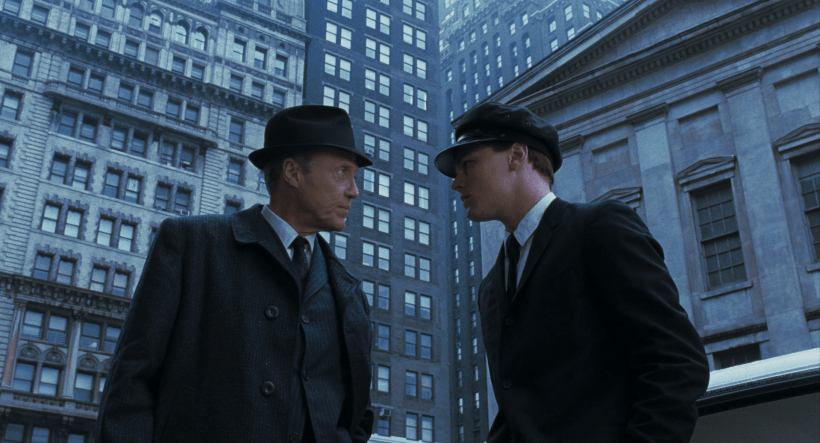



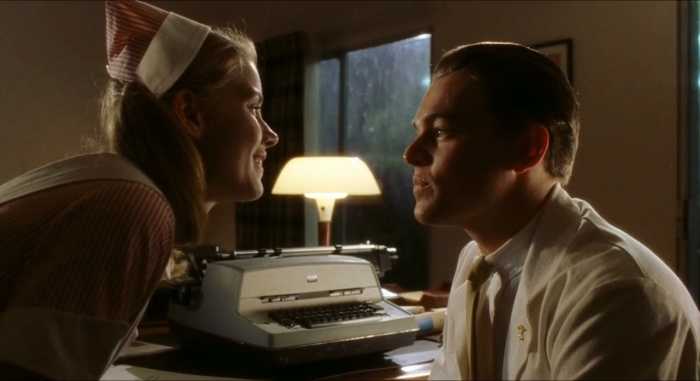
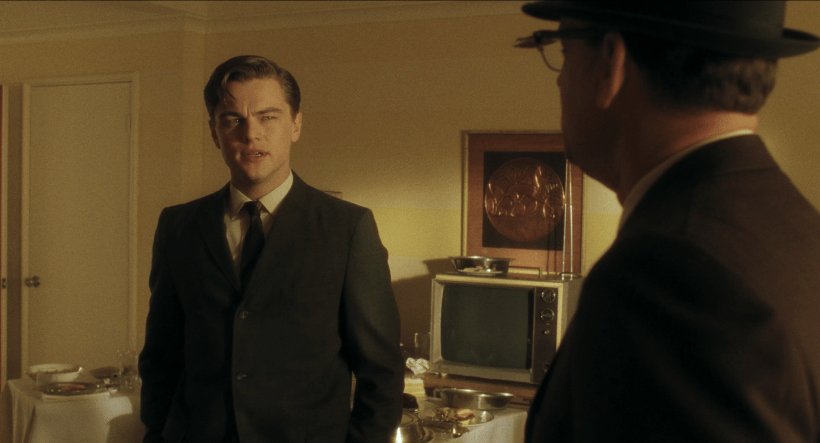

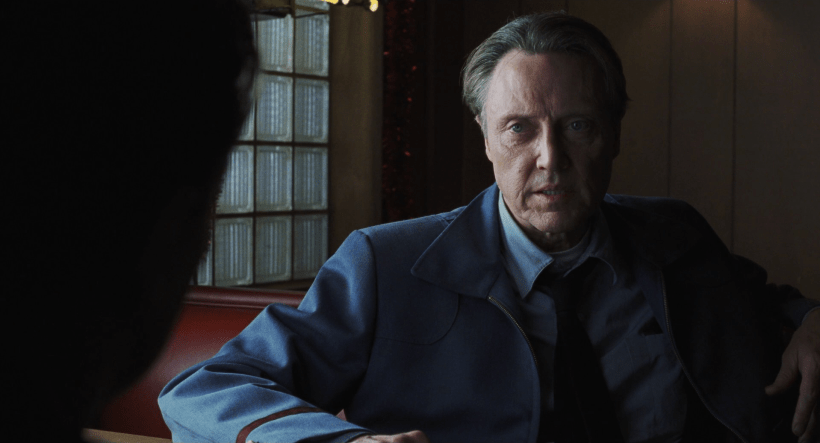

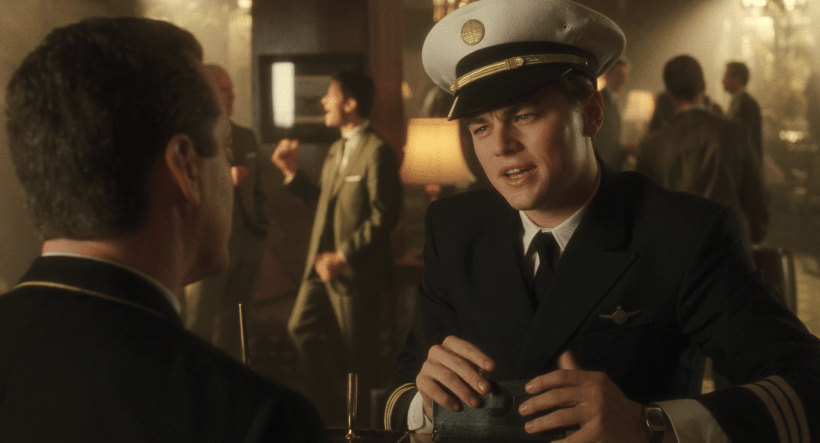
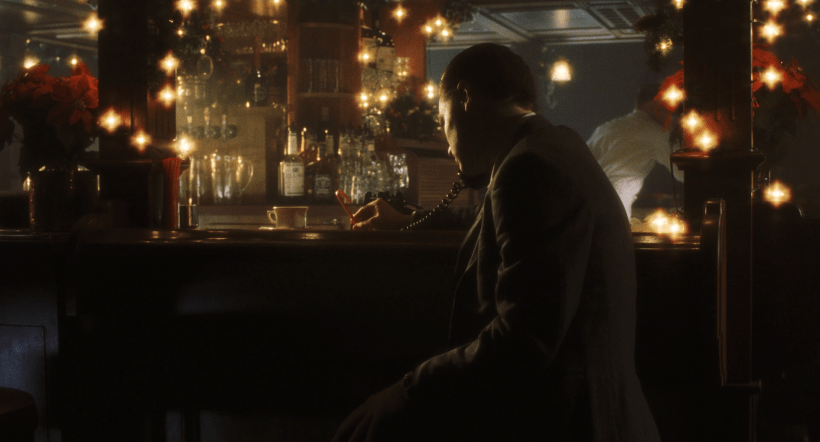
This is a really excellent review Jeff – you nailed everything about this film and filmmaker.
LikeLiked by 1 person
Thank you, Brian! It’s always a fun moment when you’re sitting there and suddenly it starts to dawn on you, “Wait a second. I think there might be something more going on here.”
LikeLike
Been waiting on this one. This movie has always intrigued me. Whenever it’s on TV, I have to stop and watch, which has always left me wondering why it wasn’t more acclaimed. I usually come at it from the perspective of Tom Hanks movies (rather than Spielberg ones) that I feel similarly about – The Terminal… That Thing You Do… The Green Mile… Saving Mr. Banks… all of which I seem to love a lot more than other critic types.
LikeLiked by 1 person
I’m glad this review provided a satisfying payoff, Shawn, because oh man, you are not going to like what I have to say about The Terminal…
LikeLike